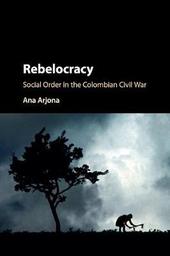
|
Rebelocracy: Social Order in the Colombian Civil War
Paperback / softback
Main Details
| Title |
Rebelocracy: Social Order in the Colombian Civil War
|
| Authors and Contributors |
By (author) Ana Arjona
|
| Series | Cambridge Studies in Comparative Politics |
|---|
| Physical Properties |
| Format:Paperback / softback | | Pages:430 | | Dimensions(mm): Height 230,Width 152 |
|
| ISBN/Barcode |
9781107571594
|
| Classifications | Dewey:303.6409861 |
|---|
| Audience | | Tertiary Education (US: College) | |
|---|
| Illustrations |
20 Tables, black and white; 5 Maps; 46 Halftones, black and white; 1 Line drawings, black and white
|
|
Publishing Details |
| Publisher |
Cambridge University Press
|
| Imprint |
Cambridge University Press
|
| Publication Date |
28 September 2017 |
| Publication Country |
United Kingdom
|
Description
Conventional wisdom portrays war zones as chaotic and anarchic. In reality, however, they are often orderly. This work introduces a new phenomenon in the study of civil war: wartime social order. It investigates theoretically and empirically the emergence and functioning of social order in conflict zones. By theorizing the interaction between combatants and civilians and how they impact wartime institutions, the study delves into rebel behavior, civilian agency and their impact on the conduct of war. Based on years of fieldwork in Colombia, the theory is tested with qualitative and quantitative evidence on communities, armed groups, and individuals in conflict zones. The study shows how armed groups strive to rule civilians, and how the latter influence the terms of that rule. The theory and empirical results illuminate our understanding of civil war, institutions, local governance, non-violent resistance, and the emergence of political order.
Author Biography
Ana Arjona is an Assistant Professor in Political Science at Northwestern University, Illinois. She is the co-editor of Rebel Governance in Civil War (Cambridge, 2015). Her work has been funded by the Harry Frank Guggenheim Foundation, SSRC, the United States Institute of Peace, Yale University, Connecticut, Columbia University, New York, the International Development Research Centre, Canada, the Folke Bernadotte Academy, Sweden, and the Department for International Development and the Economic and Social Research Council, UK.
|